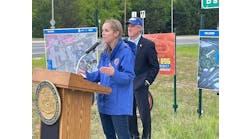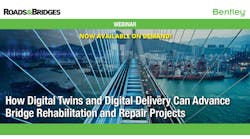By: Mark Devries
This winter when the snow begins to fall and the snow plows start to roll again, there may be some unfamiliar faces behind those plows.
Often after learning how agencies are implementing new ideas, new technologies and new methods, people start to wonder, “What would it be like to work for them?” Perhaps the idea arises after a discussion of how an agency operates, how it structures shifts and personnel, especially after hearing how an agency takes care of its staff. This could be flexibility, benefits, equipment, or, of course, compensation. But is the grass really greener in another maintenance yard? Would it really be better if we worked for that “other” agency? Is it a perception or a reality? What could we learn and how could it benefit our own agency?
Peer-to-peer networking (P2P) is one of the best ways to gather information, the exchange of which takes many forms; it may be a call, emails, pictures, documents, specifications or perhaps even a site visit. On a state level, some are funded and take the form of reviews, a domestic scan or even a gathering not unlike a mini-conference. But these are normally focused on one area and thus very limited in scope. Costs and daily responsibilities generally prohibit visits longer than a day or two. So is there a better way?
Yeah, there is
Two agencies have taken peer exchange to a new level. Bret Hodne, public works director for the city of West Des Moines, Iowa, and Ben Dow, director of operations for the city of Fargo, N.D., decided to connect for the betterment of their agencies. Hodne and Dow are members of the APWA winter maintenance sub-committee. Hodne is a past chairman of the committee, and Dow is serving as the current chairman. Sharing information, innovations, ideas, data and operational procedures has long been a practice in the winter maintenance community. For a close-knit group that faces extreme challenges each year, winter is the most critical time for both agencies, each of which is well-known for its operations and innovations. Sharing information between these agencies was common practice but they wanted to take it to a new level. What new level? Actually exchanging personnel.
“We wanted to do a more ‘walk in your shoes’ type of program,” Hodne said.
This Public Works Peer Exchange Pilot was implemented to provide the participating agencies with the opportunity to examine and evaluate their own programs through a collaborative team of peers involved in the respective work responsibilities. This exchange of ideas, best practices and experiences will hopefully benefit the participating agencies in their efforts to continually improve their operations.
How it works
Participants from each agency determined applicable periods of time within their respective schedules. It was anticipated that the exchanges would take place during the normal work week. In an effort to achieve optimum program effectiveness, the participants conducted their peer exchanges on different weeks so they would be able to collaborate while at each other’s facilities. The participating agencies were responsible for all applicable costs for their participating staff members, i.e., lodging, travel and meals. Each agency sought approval for this program under its respective policies. It was the agencies’ responsibility to also ensure all workman’s compensation or liability issues had been reviewed and addressed before the program was initiated.
Prior to the exchange, the host agency drafted an agenda for the visit. At least one week before the trip, the participants conducted a conference call to review and discuss the draft agenda. This was seen as an opportunity for both agencies to provide information and solicit ideas before finalizing the visit. During the observation process, the participants documented ideas, practices and policies that may benefit their respective agencies, which included pictures and written documentation. Then the participants reviewed and recommended at least five improvements that they would recommend implementing in their agency. Upon return, each participant planned to meet with their management team to discuss their experiences and develop a follow-up report summarizing the overall experience, including aspects of the pilot program they felt worked well and areas for improvement. Copies of both reports were made available to the public works directors.
Under these guidelines, personnel from West Des Moines and the city of Fargo each worked a different week at one another’s agency. This was done outside of winter to see how it worked prior to implementing it during the winter season. Tony Fennell (public works supervisor) and Cory Houim (equipment operator) from Fargo spent a week in West Des Moines, while Kevin Hensley (storm water supervisor) and Josh Reynolds (public works operations specialist) spent a week in Fargo. The emphasis was on sewer treatment plant operations, storm sewer cleaning operations, flooding situations and management practices, things both agencies deal with each year. While this information, along with standard operating procedures, could have been exchanged via email, there is no substitute to actually being part of the daily activity and working alongside the other agency’s personnel. It was felt on both sides of the equation that the experience of actually doing the job and observing how others overcome their daily challenges is far more rewarding than reading through someone else’s operational procedure.
What was gained
The crews returned from their experience and shared it with their co-workers. As required, they produced a report and listed their recommendations for improvements for their agency based on their experience.
“The experience was like none I have ever done before,” Hensley said. “I learned a lot. Specifically what I recommended was, we need to create a parts inventory for our camera truck and to install a computer in the vactor for the operator to maintain the database history. They have a salt brine maker similar to ours, and they made a pit under the salt brine maker for easier cleanout. We should do the same. We discussed management, and I was involved in their evaluation process, which leads me to realize that our system needs to be revamped. They have a working foreman on their crews. I saw firsthand that this provides a responsible person on each project. I will recommend we look at a similar system.”
The next step for these two agencies is to exchange personnel this winter. Each will send one supervisor and one operator. The personnel will be different from the first exchange to expand both the experience and the areas of expertise that can be explored. Those personnel have already been chosen and since much of the trip will center around being at the other agency during a significant storm event, they are going to try to have the trip set up in advance so when inclement weather is forecasted, the participants can travel on short-term notice.
The supervisors will focus on decision making:
- how the other agency plans for the event;
- what weather tools they incorporate; and
- how they inform the public, elected officials and staff about the upcoming event.
They will be involved in the decision making and will participate throughout the event. They also will be involved in the data-collection process, the post-storm evaluations and dealing with any issues that arise. The operator will be a worker like everyone else. After some quick training, they will conform to the other agency’s operations and participate by operating equipment and assisting in the snow-removal operation. They may receive multiple tasks so they can experience how different operations are carried out (such as anti-icing, bike lanes or sidewalk removals, benching and winging operations, or perhaps even working on the fleet).
The goal is to really see how another agency operates in winter and determine if some of their methods or tools could improve their own agencies’ operations. Ultimately the goal is to improve their agency through this experience, become more efficient, operate in a safer manner and thereby give a higher level of service to their customers. WM
About The Author: Devries is an application expert-services for Vaisala Inc.


